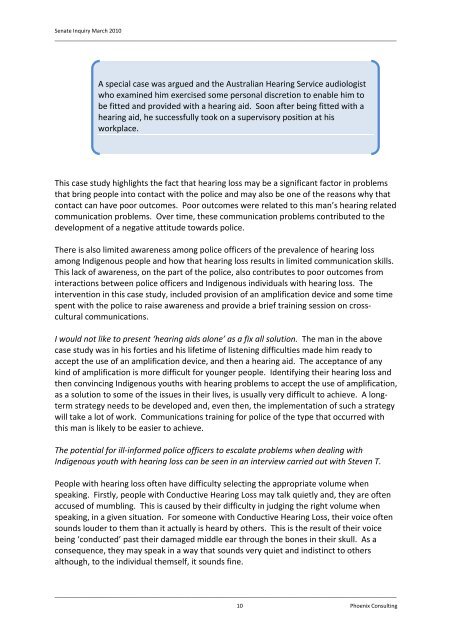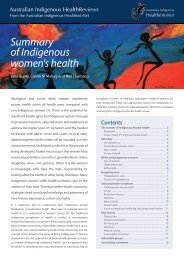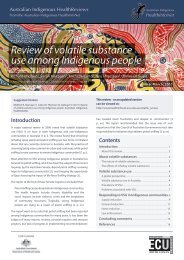hearing loss and the criminal justice system - Australian Indigenous ...
hearing loss and the criminal justice system - Australian Indigenous ...
hearing loss and the criminal justice system - Australian Indigenous ...
Create successful ePaper yourself
Turn your PDF publications into a flip-book with our unique Google optimized e-Paper software.
Senate Inquiry March 2010_________________________________________________________________________________________________________________A special case was argued <strong>and</strong> <strong>the</strong> <strong>Australian</strong> Hearing Service audiologistwho examined him exercised some personal discretion to enable him tobe fitted <strong>and</strong> provided with a <strong>hearing</strong> aid. Soon after being fitted with a<strong>hearing</strong> aid, he successfully took on a supervisory position at hisworkplace.This case study highlights <strong>the</strong> fact that <strong>hearing</strong> <strong>loss</strong> may be a significant factor in problemsthat bring people into contact with <strong>the</strong> police <strong>and</strong> may also be one of <strong>the</strong> reasons why thatcontact can have poor outcomes. Poor outcomes were related to this man’s <strong>hearing</strong> relatedcommunication problems. Over time, <strong>the</strong>se communication problems contributed to <strong>the</strong>development of a negative attitude towards police.There is also limited awareness among police officers of <strong>the</strong> prevalence of <strong>hearing</strong> <strong>loss</strong>among <strong>Indigenous</strong> people <strong>and</strong> how that <strong>hearing</strong> <strong>loss</strong> results in limited communication skills.This lack of awareness, on <strong>the</strong> part of <strong>the</strong> police, also contributes to poor outcomes frominteractions between police officers <strong>and</strong> <strong>Indigenous</strong> individuals with <strong>hearing</strong> <strong>loss</strong>. Theintervention in this case study, included provision of an amplification device <strong>and</strong> some timespent with <strong>the</strong> police to raise awareness <strong>and</strong> provide a brief training session on crossculturalcommunications.I would not like to present ‘<strong>hearing</strong> aids alone’ as a fix all solution. The man in <strong>the</strong> abovecase study was in his forties <strong>and</strong> his lifetime of listening difficulties made him ready toaccept <strong>the</strong> use of an amplification device, <strong>and</strong> <strong>the</strong>n a <strong>hearing</strong> aid. The acceptance of anykind of amplification is more difficult for younger people. Identifying <strong>the</strong>ir <strong>hearing</strong> <strong>loss</strong> <strong>and</strong><strong>the</strong>n convincing <strong>Indigenous</strong> youths with <strong>hearing</strong> problems to accept <strong>the</strong> use of amplification,as a solution to some of <strong>the</strong> issues in <strong>the</strong>ir lives, is usually very difficult to achieve. A longtermstrategy needs to be developed <strong>and</strong>, even <strong>the</strong>n, <strong>the</strong> implementation of such a strategywill take a lot of work. Communications training for police of <strong>the</strong> type that occurred withthis man is likely to be easier to achieve.The potential for ill‐informed police officers to escalate problems when dealing with<strong>Indigenous</strong> youth with <strong>hearing</strong> <strong>loss</strong> can be seen in an interview carried out with Steven T.People with <strong>hearing</strong> <strong>loss</strong> often have difficulty selecting <strong>the</strong> appropriate volume whenspeaking. Firstly, people with Conductive Hearing Loss may talk quietly <strong>and</strong>, <strong>the</strong>y are oftenaccused of mumbling. This is caused by <strong>the</strong>ir difficulty in judging <strong>the</strong> right volume whenspeaking, in a given situation. For someone with Conductive Hearing Loss, <strong>the</strong>ir voice oftensounds louder to <strong>the</strong>m than it actually is heard by o<strong>the</strong>rs. This is <strong>the</strong> result of <strong>the</strong>ir voicebeing ‘conducted’ past <strong>the</strong>ir damaged middle ear through <strong>the</strong> bones in <strong>the</strong>ir skull. As aconsequence, <strong>the</strong>y may speak in a way that sounds very quiet <strong>and</strong> indistinct to o<strong>the</strong>rsalthough, to <strong>the</strong> individual <strong>the</strong>mself, it sounds fine._________________________________________________________________________________________________________________10 Phoenix Consulting








